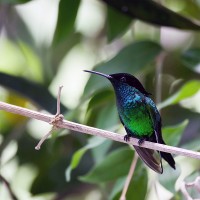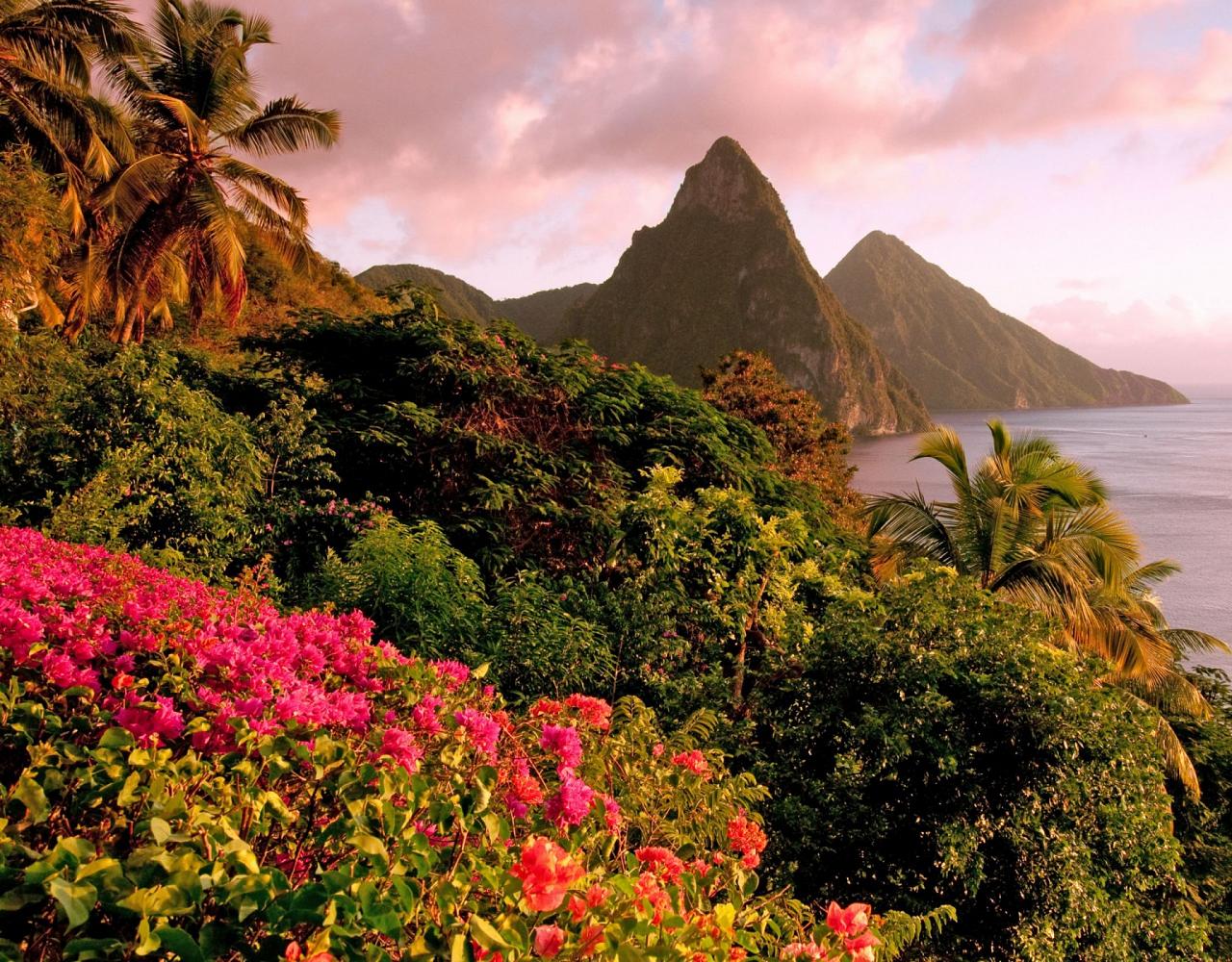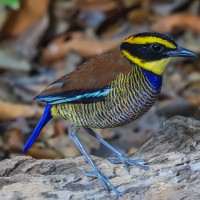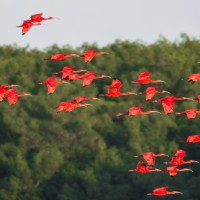- Overview
- Full Itinerary
- Photo Gallery
- Costing
- Travel Details
- Guide
- Map
- Know Before You Go
- Other Trips You May Like
Stretching from north to south between the Atlantic Ocean and the Caribbean Sea, lies an arc of tropical island gems ringed by turquoise seas and sandy beaches. Uplifted by ancient volcanic forces, verdant, lush Caribbean rainforests cloak many of these sun-kissed islands, while those with limestone soils feature seasonally dry forest. Due to their relative isolation from any large landmasses, these islands host a highly threatened collection of birds found nowhere else in the world. Collectively, there are thirty Lesser Antilles endemics plus forty-five or so Caribbean specialties.




Tour Highlights
- Enjoy the natural beauty and scenery of these tropical island paradises not often visited by birders or naturalists
- Search for over endemic bird species found only in the Lesser Antilles, including Grey Trembler and Purple-throated Carib
- Sample the rich and flavorful fusion cuisines of the islands, each having a different set of traditional dishes
- Support the conservation of critically endangered species with your visit and use of local guides
- Marvel at up to four spectacular endemic Amazona parrot species, including St. Vincent, St. Lucia, Imperial, and Red-necked
- Relax in the afternoon by snorkeling in the turquoise waters or merely strolling along “postcard perfect” sandy beaches




Trip Itinerary
Itineraries are guidelines; variations in itinerary may occur to account for weather, road conditions, closures, etc. and to maximize your experience.
Tues., Dec. 2 Arrivals in St. Lucia
Welcome to St. Lucia! Please arrive today by 4:00 PM. You are met at the airport on arrival and transferred to Balenbouche Estate. We kick off the trip tonight with a welcome dinner, getting to know our guide and fellow participants, and learning about the plans for tomorrow and the trip to come.
Accommodations at Balenbouche Estate or similar (D)
Wed., Dec. 3 - Sat., Dec. 6 Four Days Exploring St. Lucia
There are few islands in the Caribbean with such a variety of diverse habitats as St. Lucia. From its mountainous interior and lush rainforests positively teeming with tropical flora and fauna, to its dry broadleaved forests and palm fringed coasts, the first island on our tour provides numerous opportunities to experience the unparalleled beauty of the islands!
Over the next four days, we delve into the island’s signature natural attraction, the sprawling expanse of the Des Cartiers Rainforest, for an audience with the stunningly beautiful St. Lucia Parrot, songster extraordinaire Rufous-throated Solitaire, near-endemic Grey Trembler, Lesser Antillean Flycatcher, and minuscule Lesser Antillean Euphonia, brilliant Green-throated Carib, omnivorous Pearly-eyed Thrasher and cautious Scaly-naped Pigeon. We visit the historic Castries Market, a bustling epicentre of trade in produce from islands across the region (in 2020 it was ranked in the top three best food markets in the world by National Geographic). We make time to bird a remarkable ridgeline in the shadow of the iconic twin peaks of Les Pitons for close encounters with dainty St. Lucia Warbler, resplendent St. Lucia Oriole, and secretive Bridled Quail Dove. Visiting the quaint seaside village of Dennery, we have an opportunity to witness the intense bartering culture practiced by generations of local fishermen lining the pier in anticipation as boat crews return in small single-motor skiffs with line-caught marlin, tuna, and mahi-mahi. This sustainable small-scale fishing industry has existed unchanged for over a century.
Venturing into the coastal dry-forest, we can expect sighting of the near-endemic and highly threatened St. Lucia Thrasher, endemic St. Lucia Black Finch and inquisitive Mangrove Cuckoo. We also meander along the island's breath-taking coastlines at dawn where we are treated to the spectacular aerial displays of Red-billed Tropicbird and enjoying prime views of foraging Antillean Crested Hummingbird, St. Lucia Pewee, Black-faced Grassquit, Lesser Antillean Bullfinch, and Tropical Mockingbird.
Accommodations at Balenbouche Estate or similar (B,L,D)
Sun., Dec. 7 - Tues., Dec. 9 Three Days Exploring Dominica
With its seemingly innumerable waterfalls and a river for every day of the year coursing through its vast tracts of primary rainforest, Dominica is an island renowned for its outstanding natural beauty.
We travel deep into the heart of montane forest for a treasured encounter with one of the most critically endangered species on the planet: the majestic Imperial Parrot. Recent estimates suggest as few as 50 remain. These magnificent unspoilt forests and the expanse of low lying woodland beneath are also home to the island’s other endemic Amazona, the Red-necked Parrot, along with the glorious Blue-headed Hummingbird, Plumbeous Warbler, and Lesser Antillean Pewee, as well as regional endemics such as the brazen Lesser Antillean Saltator, imposing and impressive Purple-throated Carib, Scaly-breasted Thrasher, and the mesmeric Brown Trembler.
Dominica provides us with unparalleled opportunities to hike along riverine valleys teeming with over 50 species of butterfly (including regional endemics) and swim in natural pools beneath pristine waterfalls. We take to the seas for a whale watching cruise, on which possibilities include migrating Humpback and Dominica’s resident population of Sperm Whale! We also board a small craft and travel up a mangrove-lined river in search of a host of wetland-dwelling species, ending our time amongst the mangroves in true Caribbean fashion—with a sample of Dominican ‘Dynamite Bush’ rum!
Accommodations at The Tamarind Tree Hotel or similar (B,L,D)
Wed., Dec. 10 - Fri., Dec. 12 Three Days Exploring St. Vincent
The gateway to the Grenadines and the southern isles of the Lesser Antilles, St. Vincent is renowned for its black volcanic sand beaches and lush mountainous terrain, the forests of which harbour the last remaining populations of some of the rarest species to be found in the region.
Atop a fern-lined ridgeway, we gaze in awe as dozens of majestic St. Vincent Parrot abandon their roosts at dawn and begin to feed on fruiting figs and quench their thirst from dangling magnolia flowers. Our exclusive access to this privately owned land, known to only a select few forestry officers, ensures we have the entire morning in the company of this magnificent species! Settling down on a dry river bed that scythes its way through lush primary forest, we scan the surrounding vegetation for the St. Vincent (Lesser Antillean) Tanager, near-endemic Grenada Flycatcher, Spectacled Thrush, and endemic subspecies of Antillean House Wren. We also scan the skies above for the powerful Common Black Hawk. We make time to take a dip in the tranquil waters of the Caribbean Sea at our local family-run beachside hotel, and enjoy dining at sunset to a backdrop of swaying masts of yachts moored off Young Island. Enjoy your morning coffee on the restaurant balcony while enjoying flybys of Brown Pelican, Magnificent Frigatebird, Brown Noddy, Little Blue Heron, and Brown Booby. Our time in St. Vincent ends aboard a private yacht on an unforgettable day’s voyage across glistening turquoise seas to Bequia—the Island of the Clouds—where we snorkel pristine coral reefs in the presence of turtles, rays, and a plethora of other marine life. The residents of this tiny island have been welcoming those who have been fortunate enough to grace its shores for generations, and make it feel like a home away from home.
Accommodations at Beachcombers Hotel or similar (B,L,D)
Sat., Dec. 13 Departures
This morning we’ll enjoy a leisurely Caribbean breakfast, followed by a final dip in the sea before boarding pre-arranged airport transfers for your departures from Argyle International Airport. (B)
Cost of the Journey
The cost of the journey is per person based on occupancy: $7190 DBL / $7990 SGL. This price includes airport transfers, all flights between islands and internal ferry and boat charges, 11-night accommodations, all meals as stated in the itinerary, park admission fees, hotel and restaurant service charges, and guide fees.
NEW! all tips other than your NJ guide (optional) and local guide are included (this includes tips for your driver, lodge and staff, day activities, meals and other services).
This price does NOT include airfare from your home to St. Lucia and from St. Vincent, or items of a personal nature, such as drinks from the bar, telephone, and local guide gratuities (at your discretion, we will give some guidelines).
Travel Details
Please plan to make air travel plans only after the minimum group size has been met. We will send you a confirmation email as soon as the trip has been confirmed.
Arrival Airport: Hewanorra International (UVF) in St. Lucia
Arrival Details: Please plan flights to arrive on December 2, 2025 no later than 4:00 PM.
Departure Airport: Argyle International (SVD) in St. Vincent
Departure Details: Please plan flights to depart on December 13, 2025 at your leisure. (We suggest mid-morning flights or later.)
Travel Tips: This is a gorgeous part of the world and you may wish to combine some leisure time with our journey. If you plan to arrive early, we can book you an early night at our first night tour hotel, Balenbouche Estate, at an additional cost. If you want to plan something on your own, we will work with you to connect on our meet-up and drop-off plans.
Entry Requirements: See "Essential Information" section under the "Know Before You Go" tab.
-
Chris Harbard

Chris Harbard is a well-known British ornithologist and conservationist who now lives in SE Arizona. After 24 years working with the world’s largest bird conservation organisation, the Royal Society for the Protection of Birds, he moved to the Austrian optics company Swarovski and managed their birdwatching website for several years. He is now a freelance author, editor, broadcaster and lecturer, as well as an occasional bird guide in SE Arizona where he and his wife help to run the Southwest Wings Birding and Nature Festival. He is on the board of the Arizona Field Ornithologists.
Chris writes for Birdwatch magazine and was editor of the Birdwatchers' Guides series of books. His own books include Birdwatch, Songbirds, A Birdwatcher's Quizbook, A First Guide to Birdwatching.
Working as a naturalist lecturer on board expedition cruise ships for the last eighteen years has taken him to remote areas of the Arctic, Antarctic, Atlantic and Pacific. Although his main area of interest is birds, especially seabirds, he also enjoys a range of other wildlife such as cetaceans, butterflies, dragonflies and plants.Other trips with Chris Harbard
-
 Wild Scotland Cruise CLOSED - See our Scotland, Faroe Islands & Iceland Cruise in May 2026!May 18 - 29, 2025
Wild Scotland Cruise CLOSED - See our Scotland, Faroe Islands & Iceland Cruise in May 2026!May 18 - 29, 2025 -
 Southern India’s Western Ghats: Global Hotspot for BiodiversityNovember 7 - 21, 2025, w/Andaman Islands extension
Southern India’s Western Ghats: Global Hotspot for BiodiversityNovember 7 - 21, 2025, w/Andaman Islands extension -
 Caribbean Endemics of JamaicaJanuary 13 - 20, 2026
Caribbean Endemics of JamaicaJanuary 13 - 20, 2026
-
Essential Information +
Pace & Protocols +
Packing List +
Suggested Reading List +
Useful Links +
Photo credits: BANNERS: Brown Booby (NJ Stock), St. Lucia (NJ Stock), Green Turtle (Ryan Chenery), Purple-throated Carib (NJ Stock), Scenic (Ryan Chenery) THUMBNAILS: Barbados Green Monkey (NJ Stock), Brown Booby (NJ Stock), Antillean Crested Hummingbird (NJ Stock), Golden Warbler (NJ Stock), St. Vincent Parrot (NJ Stock), Lesser Antillean Flycatcher (NJ Stock), Sperm Whale (NJ Stock), Green-throated Carib (NJ Stock)



















